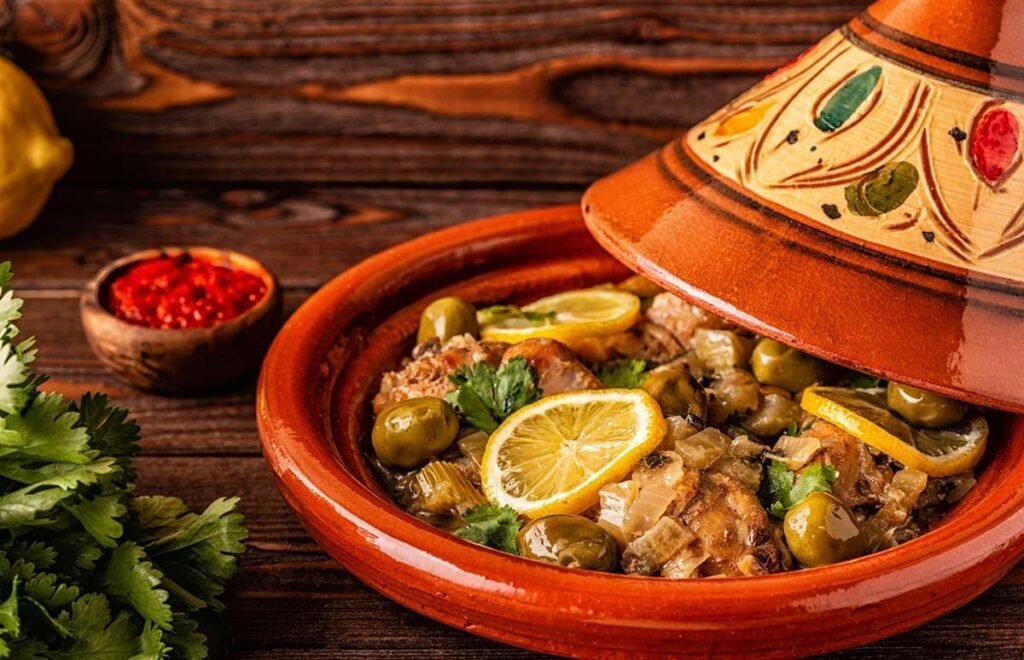
Imagine wandering through bustling marketplaces, the aroma of spices dancing in the air, vibrant colors of fresh produce, and the sound of merchants calling out as you explore Morocco’s rich tapestry of flavors. Whether you’re a seasoned foodie or a curious traveler eager to immerse yourself in authentic Moroccan cuisine, embarking on a culinary food tour offers an unforgettable sensory journey. This guide will take you deep into Morocco’s culinary landscape, revealing must-try dishes, hidden gems, and expert tips to make your food adventure truly extraordinary.
The Heart of Moroccan Cuisine: A Melting Pot of Flavors and Cultures
Moroccan cuisine is a harmonious blend of Berber, Arab, Mediterranean, and African influences, creating a culinary tapestry that’s as diverse as the country’s landscapes. From the aromatic tagines simmered slowly over open fires to the delicate sweetness of Moroccan pastries, each dish tells a story of history, geography, and cultural exchange.
According to the Moroccan Ministry of Tourism, food is an integral part of Moroccan identity, often serving as a symbol of hospitality and celebration. Exploring Morocco’s culinary scene isn’t just about tasting food—it’s about experiencing the soul of the nation.
Essential Elements of Moroccan Cuisine: Spices, Herbs, and Techniques
Before diving into specific dishes, it’s helpful to understand what makes Moroccan food so distinctive:
- Spices and Herbs: A symphony of flavors featuring cumin, saffron, cinnamon, ginger, turmeric, and coriander.
- Cooking Techniques: Slow cooking in tagines, grilling kebabs, and preparing fresh salads.
- Ingredients: Couscous, rice, lentils, preserved lemons, olives, and dried fruits.
These elements combine to create dishes that are complex yet comforting, often balancing savory, sweet, sour, and spicy notes.
Must-Try Moroccan Dishes on Your Food Tour
1. Tagine: Morocco’s Signature Stew
A staple of Moroccan cuisine, tagine is both the name of the dish and the earthenware pot in which it’s cooked. The slow-cooked stew offers tender meat (lamb, chicken, or beef) or vegetables infused with aromatic spices, dried fruits, and preserved lemons.
Personal anecdote: I remember my first experience with a lamb tagine in Marrakech’s medina. The tender meat practically melted in my mouth, complemented by the subtle sweetness of apricots and a hint of cinnamon. Pair it with freshly baked Moroccan bread called khobz, and you’re set for a flavorful feast.
Expert tip: Look for local eateries called riad restaurants that serve authentic tagines prepared by family chefs. They often use traditional recipes passed down through generations.
2. Couscous: The Queen of Moroccan Stews
Often served on Fridays and special occasions, couscous is tiny steamed balls of semolina wheat, served with a hearty stew of vegetables, meats, and spices. The dish is typically presented with a generous helping of broth poured over the fluffy grains.
Cultural insight: Moroccan couscous isn’t just a side dish—it’s a communal experience symbolizing hospitality and family bonding. Many local markets sell ready-to-cook couscous, but the real magic is in the slow steaming process that enhances its fluffiness.
3. Harira: The Nourishing Soup
A traditional Ramadan staple, harira is a hearty tomato-based soup made with lentils, chickpeas, fresh herbs, and sometimes meat. It’s served as a starter or a filling meal during cold days.
Storytelling: I sampled harira at a family-owned café in Fès. The warmth of the spices and the richness of the broth made it instantly comforting. Pair it with dates or chebakia (sweet sesame cookies) for a complete experience.
4. Pastilla (Bastilla): The Savory-Sweet Pastry
A showstopper, pastilla is a flaky pastry filled with pigeon or chicken meat, almonds, and seasoned with cinnamon and saffron. It’s often dusted with powdered sugar, creating a delightful sweet and savory contrast.
Tip: Don’t miss trying it in a traditional Moroccan restaurant where it’s served as a celebratory dish or during special occasions.
5. Kebabs and Grilled Meats
Morocco’s street food scene is bursting with flavorful kebabs, often marinated with herbs and spices, then grilled over open flames. Think skewers of lamb, beef, or chicken served with fresh bread, salads, and spicy sauces.
Experience: In the bustling streets of Chefchaouen or Essaouira, vendors prepare kebabs right before your eyes, filling the air with smoky allure.
6. Moroccan Mint Tea: The Iconic Refreshment
No culinary tour is complete without sipping Moroccan mint tea—a sweet, invigorating brew infused with fresh mint leaves and generously sweetened with sugar. It’s a symbol of hospitality and often served throughout the day.
Personal anecdote: I recall sitting on a terrace overlooking the Sahara, sipping mint tea as the sun set—an experience that captures the essence of Moroccan warmth and hospitality.
7. Moroccan Pastries and Sweets
Indulge your sweet tooth with treats like chebakia (fried sesame cookies dipped in honey), baklava, and sellou (a nutty, sweet snack). These are often enjoyed during festivals and celebrations, showcasing the country’s love for rich, aromatic desserts.
Hidden Culinary Gems: Off-the-Beaten-Path Food Experiences
While popular dishes are a must-try, exploring lesser-known foods can elevate your culinary journey:
- Zaalouk: A smoky eggplant and tomato salad served as a dip or side.
- Bissara: A hearty fava bean or pea soup, especially popular in the Atlas Mountains.
- Moroccan Pickles: Preserved lemons, carrots, and olives that add punch to many dishes.
- Street Snacks: Grilled sardines, briouats (savory pastries), and msemen (Moroccan flatbread).
Expert advice: Seek out local food markets like Marrakech’s Jemaa el-Fnaa or Fès’ medina for authentic, freshly prepared street foods that aren’t typically found in tourist spots.
Comparing Key Moroccan Dishes: A Visual Guide
| Dish | Main Ingredients | Cooking Method | Typical Occasion | Flavor Profile | Where to Find It |
|---|---|---|---|---|---|
| Tagine | Meat/vegetables, spices, dried fruits | Slow-cooked in clay pot | Daily meals, special occasions | Aromatic, savory, sweet | Riad restaurants, local eateries |
| Couscous | Semolina wheat, vegetables, meat | Steamed, served with stew | Fridays, celebrations | Light, fluffy, hearty | Markets, family homes |
| Harira | Lentils, chickpeas, tomato, herbs | Simmered broth | Ramadan, cold days | Spicy, nourishing | Street vendors, cafes |
| Pastilla | Pastry, pigeon/chicken, almonds | Baked, layered | Weddings, festivals | Sweet-savory | Traditional restaurants |
| Kebab | Meat skewers, herbs | Grilled | Street food, casual dining | Smoky, spicy | Street vendors, seaside towns |
Navigating Morocco’s Food Scene: Practical Tips
- Embrace the Market Atmosphere: Markets like Marrakech’s Jemaa el-Fnaa or Fès’ medina are treasure troves of street food. Don’t hesitate to ask locals for their favorite stalls.
- Look for Busy Stalls: Popular vendors with long queues usually serve authentic, delicious food.
- Sample Small Portions: Moroccan dishes often come in shared platters—order multiple small dishes to taste a variety.
- Respect Local Customs: Many dishes are served with your right hand or with bread—embrace these customs to enrich your experience.
- Stay Hydrated: Moroccan cuisine can be rich in spices, so drinking plenty of water and mint tea helps digestion.
Essential Resources for Food Tour Enthusiasts
- The Moroccan Ministry of Tourism offers insights on culinary traditions and recommended food destinations.
- Culture Trip provides curated guides on Moroccan street food hotspots.
- Lonely Planet’s Morocco travel guide features detailed restaurant recommendations.
- For authentic recipes, Moroccan Food websites and cookbooks are invaluable resources.
- Food and Wine Magazines often feature Moroccan cuisine for home cooks seeking to recreate the flavors.
The Ultimate Moroccan Food Tour: A Sample Itinerary
Day 1: Arrival in Marrakech; explore Jemaa el-Fnaa market, sample briouats, sellou, and fresh orange juice.
Day 2: Cooking class in a traditional riad focusing on tagine and couscous preparation. Evening: try grilled kebabs from street vendors.
Day 3: Day trip to the Atlas Mountains; enjoy hearty bissara and local mountain herbs.
Day 4: Visit Fès medina; indulge in pastries like chebakia and sip mint tea at a historic café.
Day 5: Coastal exploration in Essaouira; savor fresh seafood, especially grilled sardines and seafood tajines.
Frequently Asked Questions (FAQs)
Q: Is Moroccan cuisine suitable for vegetarians?
A: Absolutely. Many dishes like zaalouk, bissara, and vegetable tagines are vegetarian-friendly. Just specify your preference when ordering.
Q: Are Moroccan spices very spicy?
A: Not typically. Moroccan dishes tend to be flavorful but not overly spicy. If you prefer heat, ask for harissa on the side.
Q: How spicy is Moroccan food compared to other North African cuisines?
A: Moroccan cuisine balances spices with sweetness and sourness, often milder than Tunisian or Algerian cuisines, but it can vary by region and dish.
Q: Can I find Moroccan dishes outside Morocco?
A: Yes. Moroccan restaurants worldwide serve many traditional dishes, but the most authentic experiences are found within Morocco itself.
Q: What should I keep in mind regarding food hygiene?
A: Stick to busy stalls with high turnover, drink bottled water, and enjoy freshly prepared foods to minimize health risks.
Conclusion: Savoring Morocco—A Feast for the Senses
Morocco’s culinary landscape is a vibrant celebration of tradition, culture, and flavor. From the fragrant tagines simmered to perfection to the bustling street markets offering an array of snacks, every bite offers a story waiting to be discovered. Whether you’re wandering through the labyrinthine medinas of Marrakech or relaxing by the Atlantic coast, embracing Moroccan cuisine transforms your journey into a multisensory adventure.
As you plan your culinary tour, remember that the best food experiences often come from spontaneous encounters and local recommendations. Be curious, respectful, and open-minded—let Morocco’s rich flavors guide you through unforgettable memories.
So, next time you dream of exotic spices, tender meats, and sweet pastries, consider Morocco as your ultimate gastronomic destination. Your taste buds—and your soul—will thank you.
